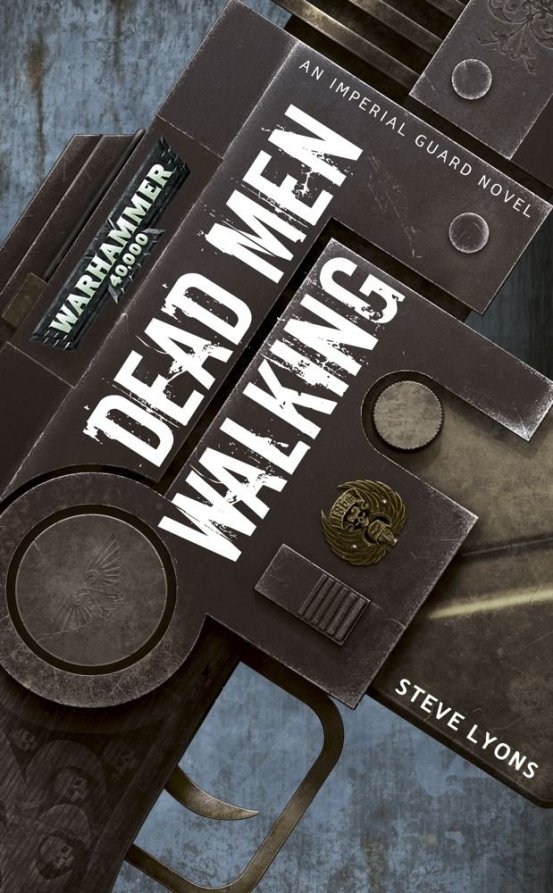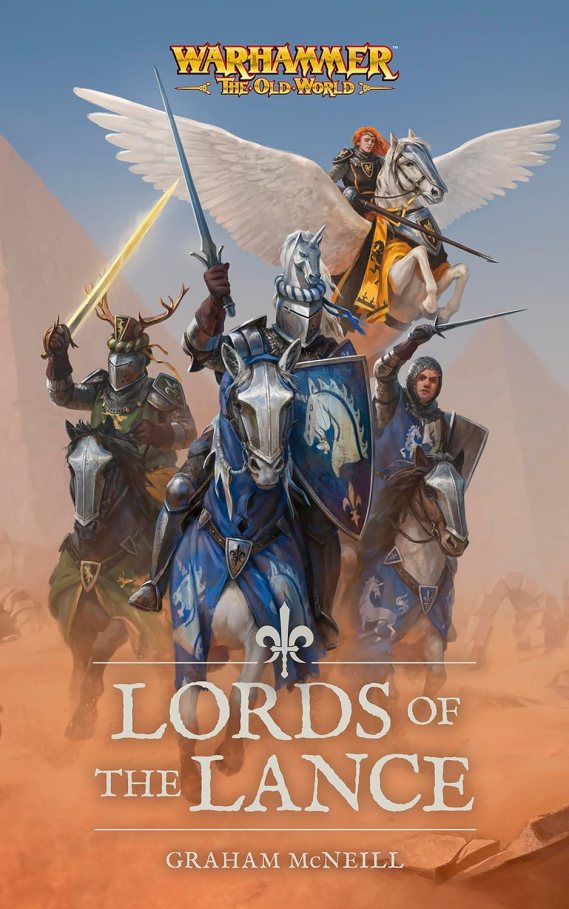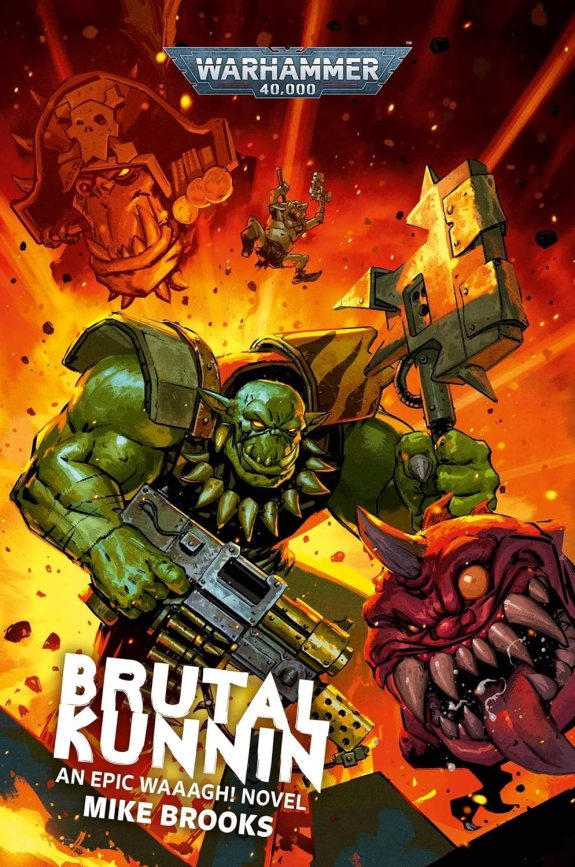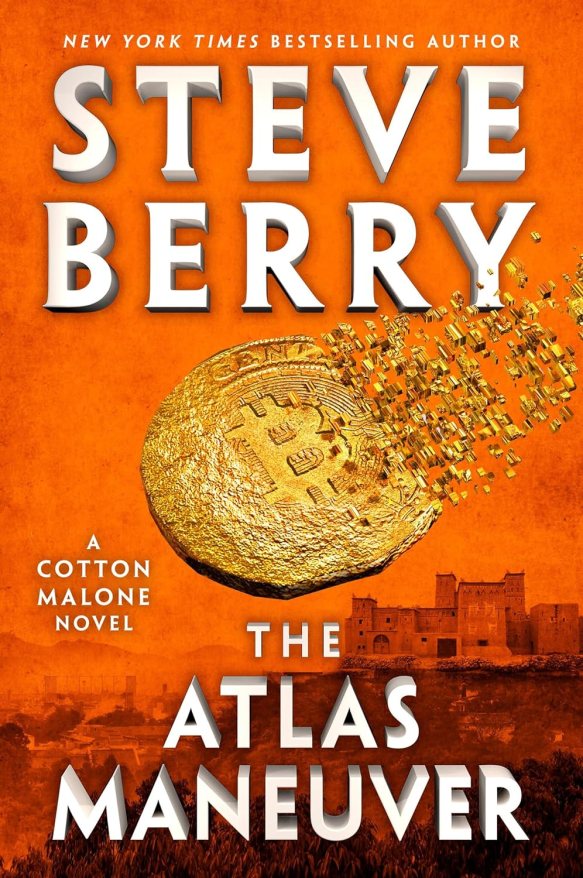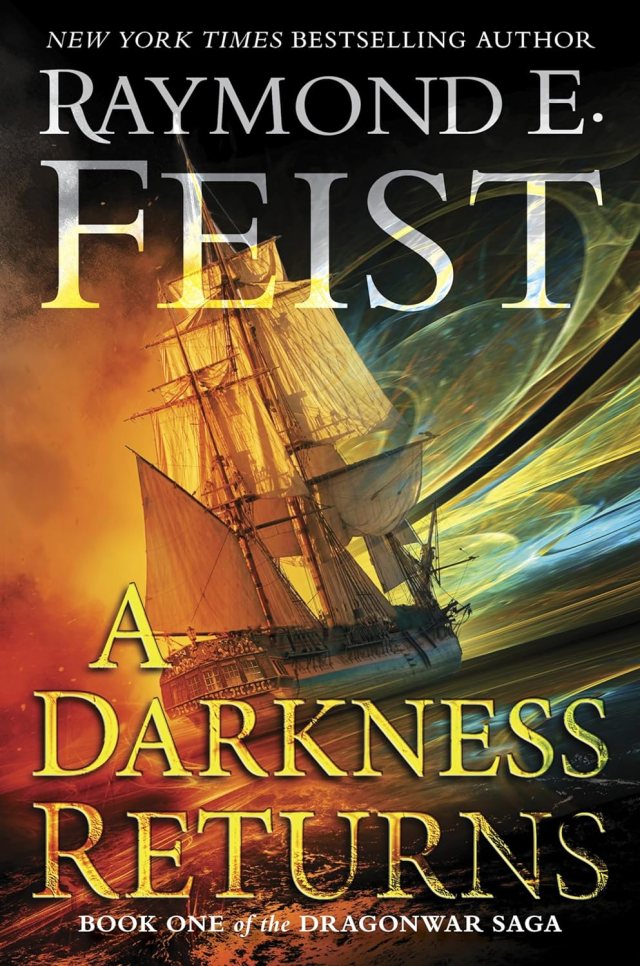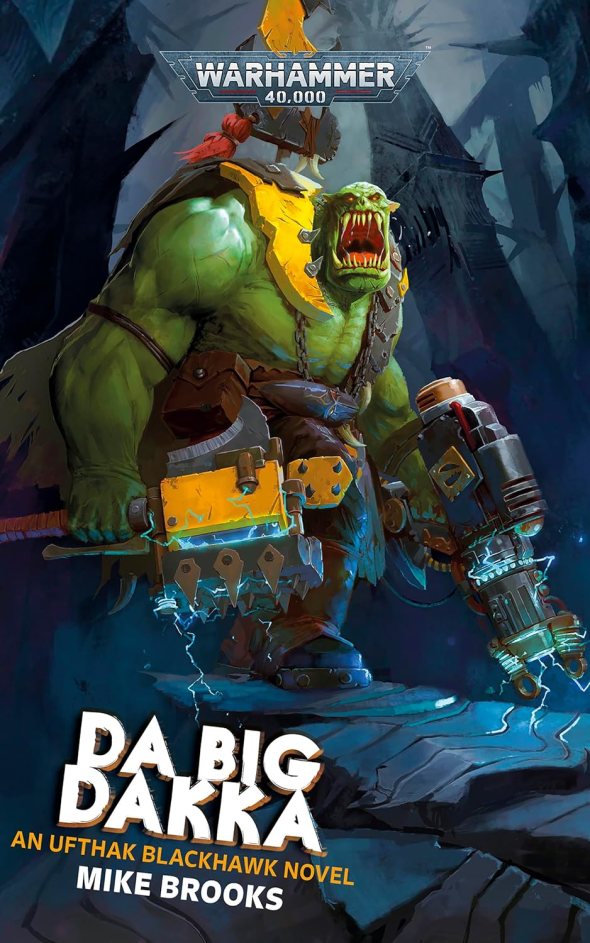
Publisher: Black Library (Audiobook – 24 February 2024)
Series: Warhammer 40,000: Ufthak Blackhawk – Book Two
Length: 9 hours and 25 minutes
My Rating: 4.75 out of 5 stars
I have been really punching out the Warhammer reviews this week, and the final one I want to bring up is the exceedingly fun novel Da Big Dakka by Mike Brooks.
Mike Brooks is an outstanding author, who has been killing it with his amazing novels in the Warhammer 40,000 universe with elaborate tales featuring some unique figures. I really enjoyed his dark novel, Huron Blackheart: Master of the Maelstrom, and The Lion: Son of the Forest was one of my favourite books and audiobooks of 2023. However, out of all of Brooks’s books, the most entertaining, exciting and outright funny are his novels that focus on the ork faction. Orks are always a fantastic group in Warhammer fiction, but Brooks has some amazing insights into these rowdy creatures. His previous ork novels, Brutal Kunnin and Warboss, have both been awesome, but I honestly think his latest book, Da Big Dakka, is his best yet.
Ufthak Blackhawk, big boss of Da Tekwaaagh! is in trouble. Sent far away into the stars by his Warboss, Da Meklord, to find loot and a good scrap, Ufthak has found barely anything to steal or fight, and now Da Meklord wants his tribute. Determined to find one big score, Ufthak is awarded a unique opportunity when his new grot servant reveals the webway, mysterious ancient portals which can lead to all sorts of unusual places. However, he has no way of entering the webway, that is until someone opens it for him.
Dhaemira Thraex is a powerful and ambitious drukhari archon, who seeks to empower her cabal and become leader of her section of the dark city of Commorragh. To that end, Dhaemira brings Ufthak and his horde into Commorragh, hoping to use the threat they present to unite her rivals behind her. Confident of a swift victory against the unorganised orks, it quickly becomes apparent that Dhaemira has underestimated the danger she has unleashed.
After years of fighting and getting stronger, Ufthak is no longer the simple ork he once was. Instead, he is now a monstrous foe who excels at killing, and who has a plan to get everything he wants. But can even the new and improved Ufthak stand against the worst that the twisted and malevolent drukhari have to throw at him, especially when treachery sprouts within his own ranks in the most unlikely of places?
Mike Brooks presents one of his funniest and most exciting novels yet as Da Big Dakka hits all the right notes for me. Utterly hilarious, loaded with over-the-top characters, and featuring two extremely awesome factions from the Warhammer 40,000 universe, Da Big Dakka had me hooked from the moment I started listening to it and refused to let go until the very last laugh.
Da Big Dakka had a great story behind it, and I liked how Brooks set it up as a direct sequel to Brutal Kunnin (which I read recently in preparation for the release of this book), while also featuring elements from Warboss. Da Big Dakka is more of a dark comedy than a serious Warhammer 40,000 novel, which is to be expected when you have a book focused on the orks. The premise behind Da Big Dakka is simple: the orks under the command of the evolving Ufthak Blackhawk have found themselves inside the drukhari city of Commorragh and must pit their savage battle skills and crude intellect against the subtle tactics of their drukhari hosts.
The drukhari, whose scenes are primarily told from the perspective of Dhaemira Thraex, initially see the orks as a minor threat, and they are more concerned with their intrigues to take them seriously. However, underestimating the orks never works out for anyone, and soon Ufthak has launched a series of insane and unpredictable counterattacks that force the drukhari to work together. As this happens, Ufthak finds himself being secretly undermined by one of his grots, Snaggi Littletoof (who previously appeared in Warboss), who his determined to lead a grot uprising and finds himself in all manner of trouble as a result. All three of these storylines come together in a big way towards the end of the book, as all the schemes, outrageous plans and badly organised rebellions, are decided in one big brawl. The final results of Da Big Dakka are pretty damn awesome, as there are some deliciously ironic comeuppances, interesting character development, and entertaining hints about what Brooks plans to do in the future.
While there are notable similarities between Da Big Dakka and the previous novel, Brutal Kunnin, as the book follows a similar thread of orks rampaging across a new world facing off against arrogant enemies, it’s hard not to fall in love with this book. You can clearly see that Brooks has evolved his style since Brutal Kunnin, and this sequel was a much stronger novel. A lot of this was down to the inclusion of one of the best characters from Warboss, who added in an extra comedic angle to the plot that vibed wonderfully with the other storylines. Brooks also amped up the petty political intrigue and plotting with the non-ork parts of the book, with the drukhari serving as an excellent antithesis to the orks. There was also a great deal more character development when it came to the protagonist, which helped to strengthen a lot of the plot. This split between these three main point of view characters was pretty damn perfect, and their alternating views of events helped to produce a very strong story.
In addition, there was excellent added complexity to Da Big Dakka’s humour, which I had a brilliant time with. While most of the comedy is based around the over-the-top antics of the orks, there is also some darker, more subtle comedic elements spread throughout the plot which plays off the other jokes extremely well. A lot of this based around ironic events, in-universe jokes, and hilarious betrayals, which really added up as the book progressed. I found myself laughing out loud multiple times while listening to Da Big Dakka, and this was one of the funnier books of 2024. Throw in a ton of over-the-top fight scenes, most of which serves to enhance the already epic story, and you have an outstanding and captivating book with pure fun at its heart.
One of the things that I always enjoy about Warhammer 40,000 fiction is the shear range of different stories and styles that can be told. Da Big Dakka for example is a much more light-hearted book that focuses on two alien races that don’t always get a lot of focus in the extended fiction. As such, this book has a great deal of appeal for those unfamiliar with Warhammer, as Brooks is required to dive into these factions without weighing the reader down with too much heavy plot. New readers can easily enjoy this book without any real pre-knowledge or conceptions about the Warhammer 40,000 universe and still have an outstanding time with the unique story and characters. It can also be readily enjoyed by those who haven’t read the preceding two novels, Brutal Kunnin and Warboss, as Brooks makes the story very accessible. Naturally, established fans and those who have read Brooks’ prior novels will get a lot more out of Da Big Dakka, mainly because there is some interesting progression of character arcs, and because Brooks provides outstanding look at the orks and the drukhari.
As with his previous two novels, I was deeply impressed with how Brooks portrayed the orks in Da Big Dakka. The orks are always a very entertaining bunch, and their hooligan-esque actions, desire to fight, and unique outlook on life makes for some fun reading. Pretty much every book that features an ork character is bound to be more on the comedic side, and Brooks delivers this in spades, loading up the story with a ton of funny observations, in-jokes and outrageous behaviours that proved to be exceedingly entertaining. Brooks really amps up the unpredictable nature of the orks in Da Big Dakka, and there was a good recurring theme about being underestimated. While Brooks went a little light on describing ork technology and the different clans, mainly because he’s covered that before, there was an interesting look at ork psychology and biology which showcased why they fight and how it benefits them. The author also featured a great look at the ork sub-race known as the grots, who have an expanded role in this book. Smaller, weaker and extremely bullied members of the ork race, the grots serve as a snivelling slave caste, and offer some fun comedic relief. A good part of the plot revolves around the grots and their cowardly nature, and it was really entertaining to see Brooks’s take on their mindset and place in ork society, especially when one of their number tries something different. Honestly every scene featuring a major ork character was entertaining or interesting in some way or another, and I really love how well Brooks portrays this awesome faction.
While Da Big Dakka is mostly dedicated to the orks, Brooks also spends a ton of time focusing on one of the more intriguing factions in the canon, the drukhari. Previously known as the dark eldar, the drukhari are one of the more underutilised groups in Warhammer 40,000 fiction, and it was great to see them here. Essentially evil space elves, the drukhari live in an extra-dimensional city and require the pain of others to survive (think the Cenobites from Hellraiser). As Da Big Dakka is primarily set in a section of their city and features a drukhari as a main character, Brooks showcases a lot of the drukhari lore in this book, which was really cool. This book features an in-depth look at the drukhari, with their unique units, weaponry and vehicles strongly featured. However, Brooks goes even deeper than that, focusing on the politics of the drukhari characters, the various alliances that bind them, and entire basis of their existence. I loved the fascinating examination of why they require pain to survive, as well as their thoughts on mortality, and this became a key part of the book’s plot. You get a real clash of styles between the two factions, and the orks are constantly frustrated by the hit-and-run tactics of the drukhari (or the spikiez, as the orks know them). I also loved how cool the city of Commorragh proved as a background to the plot, and Brooks features several unique drukhari structures and locations that made for some great battlefields. The entire final sequence takes place in one of their arenas, and it was very fun to see the protagonist face off against some of the drukhari captives. I honestly really loved that Brooks featured the drukhari here, and I hope we see more Warhammer authors use them in the future as they are so underutilised.
I also must highlight the excellent character work featured within Da Big Dakka, as Brooks featured some amazing figures whose unique insights added so much to the impact of this book. The primary character is the ork big boss, Ufthak Blackhawk, who previously served as the protagonist of Brutal Kunnin. Since we last saw him, Ufthak has literally grown into his role as a boss, as his victories have transformed Ufthak into a massive monster. This physical growth has also resulted in him becoming smarter, and a lot of his storyline revolves around him utilising this new intellect for the first time. It also makes him more ambitious and insightful, and it was fascinating to see him interact with the other characters in the book, especially the main drukhari figure. Indeed, the one scene where they have a frank conversation was probably one of my favourites in the entire book, with Ufthak proving to be her intellectual match. Despite this newfound and somewhat unwanted ability to think, Ufthak is still an ork at heart and he acts accordingly, with lots of destruction and carnage coming from him alone. Ufthak is also a major source of comedy as his cynical, hilarious, and often surprisingly accurate insights into the drukhari, his fellow orks, and the other races of the galaxy, are so funny. It will be interesting to see what adventures Brooks has planned for Ufthak in the future, as he is clearly positioning him to be a major recurring figure in his books.
Aside from Ufthak, the other two major characters of the book are the drukhari archon, Dhaemira Thraex and the grot Snaggi Littletoof, both of whom add some great alternate elements to the story. Dhaemira is a ruthless drukhari strategist, who revels in schemes, plots and ambitious powerplays. The person ultimately responsible for much of the carnage in Da Big Dakka, Dhaemira proves to be a fantastic figure to follow, especially as the reader gets most of their view of the drukhari from her. Dhaemira proves to be an excellent alternative protagonist to Ufthak, mainly because the two are so different, and it was fascinating to see their clash of styles and personality, even though they have more common ground then you would expect. I really loved Dhaemira’s narrative, which goes in some interesting directions, including an unlikely romance, and it really played off the ork perspective chapters so well.
The final key ingredient to this mix was Snaggi Littletoof, the self-proclaimed Grotboss and prophet of Gork and Mork. Snaggi, who previously appeared in Warboss, is determined to lead a grot rebellion to overthrow the orks and place him in charge. Unfortunately, Snaggi is held back due to the stupidity of his minions, as well as his own inaccurate sense of self-importance. His entire storyline of attempted rebellion was a welcome addition to the plot as it served an interesting middle ground between Ufthak’s direct actions and Dhaemira’s more subtle plots. It also added some excellent additional humour, as Snaggi’s various schemes to take over the ork band, go in some interesting directions that often balance unlikely success with massive failure. This fantastic combination of characters was so much fun, and I really loved how well Brooks introduced them and balanced them out throughout Da Big Dakka.
I checked out this Warhammer novel in its audiobook format, which is the best way to enjoy the over-the-top action and big personalities of this franchise. Da Big Dakka is a great example of this, and I love how all the amazing scenes and fun fights really come to life when they are read out to you. In Da Big Dakka’s case, a lot of this is due to narrator Harry Myers, who is quickly becoming one of my favourite Warhammer audiobook voice actors. Not only has he really impressed me in Brooks’s previous ork audiobook, Warboss, but Myers was also brilliant narrating two of my all-time favourite Warhammer 40,000 novels, Day of Ascension by Adrian Tchaikovsky and The Wraithbone Phoenix by Alec Worley. Myers has such an amazing and booming voice and a great British accent that really fits the hooligan-aesthetics of the orks. He effectively works through a series of voices in Da Big Dakka, that includes the commanding voice of main character Ufthak Blackhawk, and the high-pitched whiny voices of the various grots. While his voice wasn’t always the most effective for conveying the subtle mannerisms of the ethereal drukhari, Myer still did an excellent job portraying them throughout this book, and I loved how efficiently and entertainingly he moved the plot along. I honestly don’t think I would have had as much fun with Da Big Dakka without Myers’s narration, and with a run time just short of nine and a half hours, this is a very easy audiobook to get through and enjoy.
Mike Brooks continues to impress me with his outstanding and epic contributions to the Warhammer 40,000 franchise, especially as he so clearly grows as an author with each book he writes. His latest novel, Da Big Dakka, is a captivating and deeply hilarious piece of Warhammer fiction that tells an awesome story, while also expertly using the franchise’s most unique factions. Wildly entertaining, incredibly funny, and subtly clever, Da Big Dakka was particularly fun to read and comes highly recommended. I cannot wait to see what wonderous piece of Warhammer fiction Mike Brooks will write next, as I know I am going to love it.

